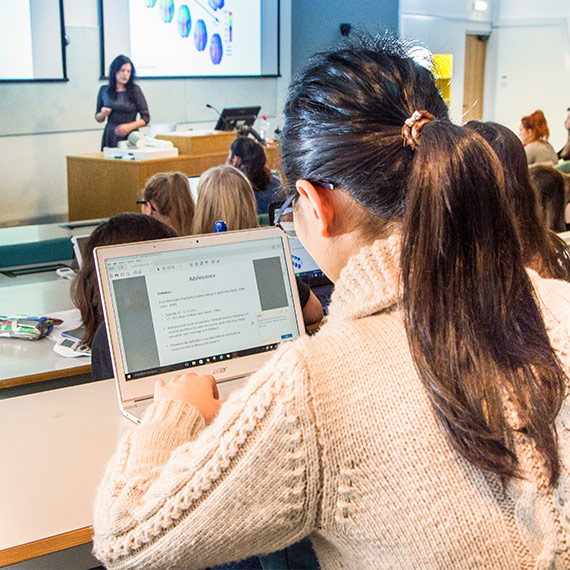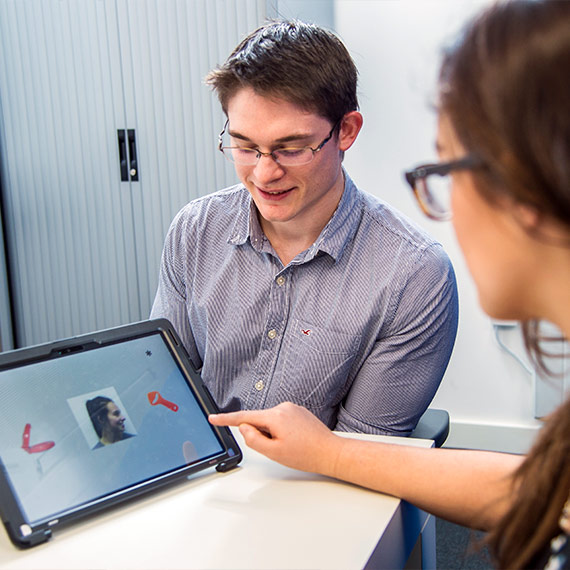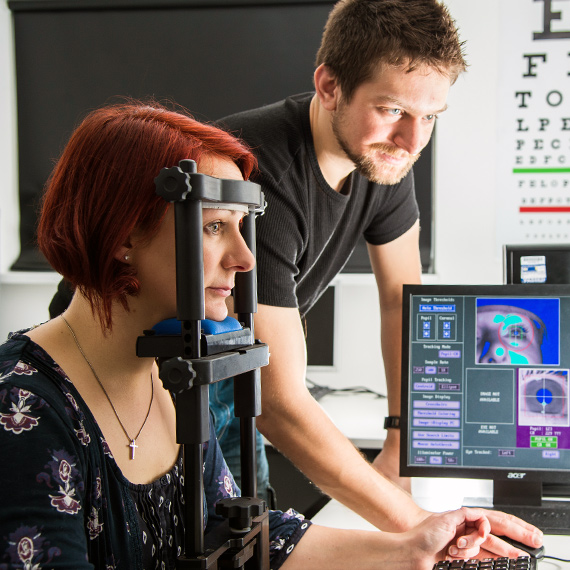
Our Teaching
You are at the centre of our degree programmes. Our lectures, assessments and study support are designed to help you achieve the best result.
Linked icons
Lectures, Seminars and Practicals
We use a mix of lectures, seminars and practical lab sessions to enhance your learning and to develop essential skills throughout your degree.
We encourage increasingly independent study throughout your degree. The University's policy is that your working week should consist of 40 hours of studying. If you have 10 hours of teaching time, we expect you to spend a further 30 hours on private study. In the Understanding Psychology module, you will attend two lectures a week plus one seminar group. In the Investigating Psychology module, you will go to two lectures plus a small group practical class twice a week.
Lectures
Lectures provide an introduction to the key issues and findings in each topic and are delivered by an expert in that particular field.
Seminars
Seminars are a weekly one-hour session where you will be encouraged to discuss your learnings with a small group of fellow students, under the guidance of a tutor. We encourage you to make the most of these groups by speaking out, listening to others and learning. You will soon increasingly present yourself with knowledge and confidence. You'll become experienced in being part of a team and explore the topics under study together.
Practical classes
Practical classes are designed to help you discover for yourself the key psychological research methods. You will also get hands-on experience conducting your own psychology experiments in small groups.

Assessment
The way we structure our assessment allows you to manage and pace your studies, as well as giving you feedback on a regular basis.
First-year assessment (Part I)
PSYC101 Understanding Psychology
- one essay each term*
- fortnightly web assessments
- end of year exam
PSYC102 Investigating Psychology
- two practical lab reports
- eight class tests
- weekly web assessment
- end of year exam
*you will receive advice on essay writing throughout the course, in both lectures and seminars
Common to both modules is web assessment. Each seminar has an associated set of preparatory readings, and the web-based evaluation will present a series of questions relating to the texts. You will need to complete these before each seminar. These assessments allow you to monitor your progress and check your understanding of the work set.
Second and third-year assessment (Part II)
For most of your Part II modules, you will be assessed by a coursework component and an exam component, with 33% of coursework and 67% of exams. The research methods modules in the second year are coursework only. We mark your third-year independent research project on the report itself and oral presentation.
The methods we use to assess you have been chosen to support you by identifying your strengths and weaknesses, as well as counting towards your module mark. We focus on developing skills that will help you on the subject and also in general - we have seen that this is very useful when applying for jobs.
In the second year, you will be assessed in a variety of ways:
- a short report
- report critique
- essay
- class test
- research report
The third-year extends to different skills and looks at oral presentation, poster and individual report, group work presentation and media analysis, alongside essays. There are also plenty of informal opportunities throughout your degree for personal development.

Study Support
The Psychology Department has a student-centred approach and is committed to offering you advice and support throughout your studies.
Academic Tutor System
We will allocate you an Academic Tutor who you will meet with on a one-to-one basis each term. With an understanding of your progress through your ongoing assessment, your tutor will be in an excellent position to provide guidance and support with your studies.
Individual Development Plans
Your Academic Tutor will work with you to produce a plan to help you make the most of your studies. The Tutor will help you to identify your strengths and weaknesses throughout the course. We will show you how to tackle any areas that you may need help with and support you in following the path most suited to your individual preferences and skills.
Support across the Department
You will have an overall Part I tutor, a range of the first year module tutors, plus seminar and practical class staff who are all available to support you academically, in addition to your Academic Tutor. Lancaster University is committed to a minimum amount of contact time that you will have with your tutors and also sets out guidance for contact outside of standard teaching. We will give you details about the hours and how to make contact when you begin your studies with us.
Student Representation
One of the remits of our Student Representation committee is to provide consultation and advice should you experience difficulties with your studies. Student members are elected to meet with all of the staff and tutors on your Part I course at least once a term to raise any matters that need response or change.
Student Learning Advisor
You can get additional writing and study support from Robert Blake, the Student Learning Advisor for the Faculty of Science and Technology (which Psychology is part of). Robert offers one-to-one consultations for topics such as academic reading and writing, note-taking strategies and preparation for exams. If you think you have a disability that is affecting your work, such as dyslexia, additional study consultations are available.
During your time at Lancaster, we will challenge you academically. Providing support to our students to help you to become the very best is a crucial part of our ethos. We want you to achieve your full potential through effective study practices and good scientific writing.
Your student learning advisor offers drop-in sessions, 1-1 meetings and workshops for undergraduate and postgraduate students. Get in touch for:
- consultations on writing reports, essays and your dissertation
- reading, writing and exam techniques
International students
We have courses, workshops and drop-in sessions to help you with your studies, grammar and writing at Lancaster.
Students with disabilities
If you think you have a disability that affects your study, such as dyslexia, you may find it helpful to arrange a study consultation.

Developing your Skills
Your psychology degree will build your confidence in a range of essential skills that employers value, and we have a support system in place to help you achieve your personal best.
Psychology students graduate with a range of transferable skills that are recognised by employers:
- literacy: writing fluently, including being able to formulate and articulate arguments clearly
- numeracy: being able to handle and interpret statistical information, including using data analysis packages
- interpersonal skills: understanding and managing social communication and interaction with others without conflict
- problem-solving: identifying different strategies and approaches to solving problems
- critical evaluation: analysing and appraising information or situations realistically
- information gathering: finding the right information by knowing where to look, what to use and how to use it
- independent working: using your own initiative and knowing what to do when the advice runs out
In a dedicated first-year module, we will help you to develop vital skills to help you prepare for your future career.
- time management
- career planning
- CV development
- job interview skills
- the dynamics, roles and challenges of working in a team environment
- guidance on careers in psychology (with reference to the British Psychological Society)
You will have the opportunity to put these skills into practice through voluntary or paid internships.

Freedom to Choose
Make the most of the flexible nature of our degree programme to focus on the areas that you enjoy the most. In both the first and third year, you have the freedom to choose.
Degree structure
You can choose whether to study a single or joint honours degree.
For single honours, you can choose whether to graduate with a 3-year BA Hons or BSc Hons Psychology degree. This option does not affect what you study throughout your 3-year degree, and it is just what qualification you choose at the end.
With joint honours, you can study:
- Organisation Studies and Psychology: BA Hons
- Linguistics and Psychology: BA Hons
- French and Psychology: BA Hons
- German and Psychology: BA Hons
- Spanish and Psychology: BA Hons
- Marketing with Psychology: BSc Hons
- Biology with Psychology: BSc Hons
Please note that combined honours with Organisation Studies, Linguistics, French, German and Spanish can give you British Psychology Society accreditation, but psychology with Marketing or Biology cannot.
First-year options
In addition to your core modules Understanding Psychology and Investigating Psychology, you can study another subject entirely of your own choice. This other subject can be anything that you like as long as it fits in with your timetable. We find that most of our students tend to opt for disciplines such as criminology, sociology or philosophy.
Third-year options
There are two compulsory modules this year: History and Conceptual Issues in Psychology plus your independent research project, which our students enjoy doing.
You then choose a further five modules: 3 core plus two optional or four core plus one optional.
Core modules
- Advanced Human Neuropsychology
- Advanced Developmental Psychology
- Advanced Cognitive Psychology
- Advanced Social Psychology
Optional modules
These are topics which link to our latest research here at Lancaster, so they do change. To give you a flavour of the kind of areas you might look at, our current subjects are:
- The Psychology of Attention: From the Laboratory to Everyday Behaviour
- Topics in Clinical Psychology
- Neuroscience of Social and Emotional Development
- Prozac Nation: Human Psychopharmacology
- Forensic and Investigative Psychology


